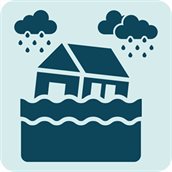Policies & regulations for pluvial floods
The Dutch government's approach to preventing pluvial flooding focuses on ensuring sufficient space for water storage and drainage. Water authorities and the national government (Rijkswaterstaat), as water managers, can create space for water within the water system. Provinces and municipalities can designate areas for water storage. Municipalities also ensure the drainage of excess water from urbanised areas.
In line with the Environment and Planning Act (Article 2.13), standards for surface water system management are established at the provincial level. Maintaining these standards are a responsibility of water authorities. They must meet the minimum requirements for drainage and storage capacity of surface water systems to prevent flooding. The current standards (PDF) express the probability of pluvial flooding per land use category, based on an economic assessment of investment versus avoided damage.
The municipality is responsible for collecting rainwater runoff if the property owner cannot process it themselves and if the necessary measures taken by the municipality are effective and efficient. In urbanised areas, heavy rainfall can quickly lead to localised flooding. Rapidly draining and discharging water can then be an impossible task. Therefore, space is sometimes reserved locally to retain water, such as in wadis or underground facilities. The municipality can include regulations for preventing pluvial flooding in the Environmental Plan. These rules obligate developers and residents to take certain measures against pluvial flooding. A municipality can also indicate what level of pluvial flooding is considered acceptable,
Property owners are expected and encouraged to also play a role in the management of pluvial flood risks by delaying rainwater discharge from their properties and (temporary) water storage. In areas with higher exposure, governmental organisations can inform home owners about the risks and the measures that they can take to prevent damages, as well as about possible insurance options.
In July 2021, extreme rainfall caused flooding in the Province of Limburg, Belgium, and Germany (PDF). This caused an estimated €433 million in damages in Limburg alone. In response, the Dutch government established the Policy Advice Committee on Waterlogging and High Water (in Dutch: Beleidstafel wateroverlast en hoogwater) to advise on improvements in flood protection.
The final advice outlined seven key points for governments, citizens, and the private sector to act on: raising public awareness and self-reliance, managing entire catchment areas, enhancing protection against waterlogging, crisis preparation, climate-resilient recovery, cross-border cooperation, and integrated execution and knowledge sharing.

